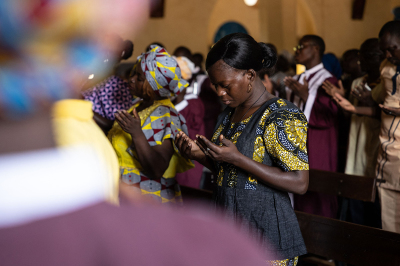Tectonic shifts needed in global Christianity

If you think Christianity today is a religion that is mostly American or maybe European, you have been misled. In fact, if you’re a Christian and English is your native language, then welcome to a world in which you are actually the minority.
As a pastor in metropolitan Washington, D.C., I have deep conviction that it is vital for Christians to care about the church in our country. At the same time, we need to remember that Jesus’ perspective is much broader. And when we take the time to look at the Church around the world, we will realize that we need to make major changes in our perspective — and more importantly in our lives.
The organization I founded, Radical, released a video based on research collected in association with the Lausanne Congress that recently hosted thousands of global Christian leaders in South Korea. This video highlights how Christians are poised to experience the greatest net loss of any major world religion over the coming years. At present, we are witnessing the largest number of people in history leave this earth without ever even hearing about the love of Jesus.
Yet the good news is that Christians have more opportunities than ever before to change this story and make our lives count for what matters forever. So, what specifically needs to change?
Fundamentally, Christians need to see themselves as part of a truly global family. Just 50 years ago, the majority of Christians lived in the West, with the remainder living in Africa, Asia, and Latin America. Today, the epicenter of Christianity is firmly fixed in the global south as over 70% of all Christians (and climbing) live in Africa, Asia, and Latin America.
This perspective change is particularly critical for understanding how God’s love will spread in the world. According to Matthew Niermann, director of Lausanne’s State of the Great Commission Report, the work of “Christian missions” used to be seen as “from the West to the rest.” But now, it’s from “everywhere to everywhere.” That means Christians in North America and Europe need to see themselves less as leaders and more as co-laborers who serve alongside the global church in the Great Commission.
Yet even mention of the Great Commission reveals the most significant change that’s needed. The most recent data reveals a fatal flaw for Christianity: Most Christians in the West and around the world either don’t know they’re called to spread the Good News of God’s love to all nations, or they don’t know how to do so. As a result, most Christians are sitting on the sidelines when it comes to God’s ultimate purpose for their lives.
This is an extremely significant problem, with eternal ramifications. Not only are Christians missing out on our purpose in this world, but more people are dying without the Gospel than ever before. Over three billion people have never even heard the truth about who Jesus is and how much he loves them. Approximately 86% of Muslims, Hindus, and Buddhists don’t know a single Christian.
Unfortunately, at least in the West, the Church’s answer to this problem for far too long has been to send a few hundred — or even a few thousand — more missionaries to solve it.
But surely that’s not the only answer for billions of people who don’t know the Gospel: the good news that Jesus lived a sinless life, died on the cross for our sins, and rose from the grave so that all who trust in him can be restored to relationship with God forever. What’s needed are not just hundreds or thousands more missionaries from one part of the world spreading this Gospel to the nations, but hundreds of thousands and millions upon millions of Christians from all around the world spreading this Gospel to the nations.
And this isn’t too far from our grasp, in practical terms. The opportunities for everyday Christians to spread the Gospel globally are greater than ever before.
Gone are the days when physical geography and national borders meant only a few Christians could engage the nations with the love of Jesus. Today, Christians can spread the Gospel across countries and continents in real-time in multiple languages through devices we carry in our pockets. The ease of air travel, globalization of the marketplace, ever-increasing urbanization, and migration of peoples all create unprecedented proximity to people without the Gospel. On top of all these dynamics, God has entrusted extraordinary wealth to the hands of Christians around the world.
When you put all of this together, you realize that by God’s grace and in the power of God’s Spirit, reaching all the nations with the love of Jesus is actually possible for Christians today. But in order for this to happen, a tectonic shift needs to occur in Christianity.
Multitudes of individual Christians need to wake up and see that the purpose of each of our lives is to follow Jesus and make him known in our neighborhoods and among all nations. And churches all around the world need to encourage and equip Christians to put this purpose into action.
If this happens, the narrative can completely change, and no one and nothing will be able to stop the spread of God’s love in Jesus to the ends of the earth.
David Platt is a pastor at McLean Bible Church in the Washington, DC metro area. He is also the founder of Radical.





















